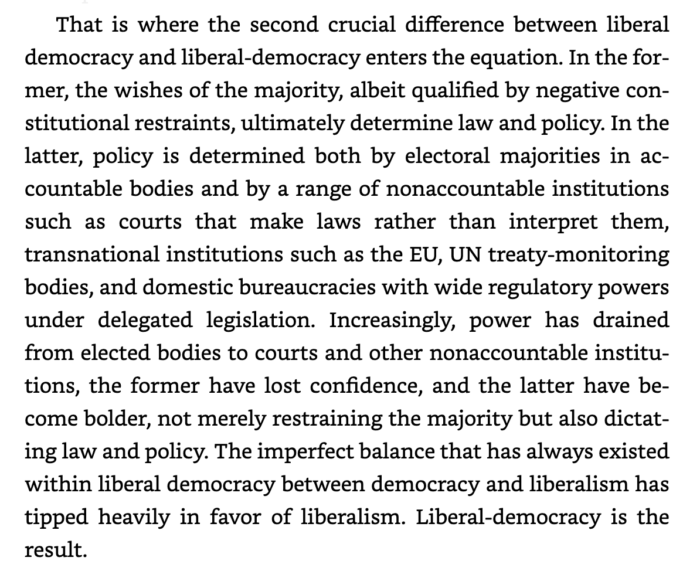The Reality Of Left-Wing Authoritarianism

I find it both amusing and annoying that all the liberal Democrat and establishment Republican vilification of Hungary for being supposedly authoritarian overlooks all the authoritarian ways of the current Western regime. The book to read on this is the Polish philosopher and statesman Ryszard Legutko’s The Demon In Democracy. From John O’Sullivan’s introduction to the English translation:





People of the Right who pay attention are not fooled by this. Many people on the Left don’t see their own authoritarianism because (I figure) they believe they are using their authoritarian powers for the Good.
Donald Trump’s rise to power generated a flood of media coverage and academic research on authoritarianism—or at least the kind of authoritarianism that exists on the political right. Over the past several years, some researchers have theorized that Trump couldn’t have won in 2016 without support from Americans who deplore political compromise and want leaders to rule with a strong hand. Although right-wing authoritarianism is well documented, social psychologists do not all agree that a leftist version even exists. In February 2020, the Society for Personality and Social Psychology held a symposium called “Is Left-Wing Authoritarianism Real? Evidence on Both Sides of the Debate.”
JOIN THE ATLANTIC FESTIVAL. WHEREVER YOU ARE.
The Atlantic’s biggest live-event series returns this September for an expanded seven days of can’t-miss conversations and experiences. Reserve your spot today.
An ambitious new study on the subject by the Emory University researcher Thomas H. Costello and five colleagues should settle the question. It proposes a rigorous new measure of antidemocratic attitudes on the left. And, by drawing on a survey of 7,258 adults, Costello’s team firmly establishes that such attitudes exist on both sides of the American electorate. (One co-author on the paper, I should note, was Costello’s adviser, the late Scott Lilienfeld—with whom I wrote a 2013 book and numerous articles.) Intriguingly, the researchers found some common traits between left-wing and right-wing authoritarians, including a “preference for social uniformity, prejudice towards different others, willingness to wield group authority to coerce behavior, cognitive rigidity, aggression and punitiveness towards perceived enemies, outsized concern for hierarchy, and moral absolutism.”
Satel says the evidence in the Costello study is so overwhelming that it makes you wonder why on earth social scientists have missed this phenomenon. I don’t wonder at all! Fish don’t wonder about water, do they? Satel writes:
But one reason left-wing authoritarianism barely shows up in social-psychology research is that most academic experts in the field are based at institutions where prevailing attitudes are far to the left of society as a whole. Scholars who personally support the left’s social vision—such as redistributing income, countering racism, and more—may simply be slow to identify authoritarianism among people with similar goals.
Satel, a psychiatrist, says that even today, researchers assume that there are far more right-wing authoritarians in the US than left-wing ones. My hunch is that this is another false finding that depends on the fact that there are almost no non-leftists in the field of social psychology. More:
The other virtue of the Costello team’s work is its status as a sobering demonstration of how social psychology’s dominant ideological orientation has constrained the scope of inquiry. “The dominant view of RWA as the ‘gold standard’ of authoritarianism writ large is not merely an influential theoretical framework or a historical quirk,” the authors write. “It limits the questions we ask as scientists [and] the types of theories we use to interpret our results.” For many years, what was perfectly obvious to many outside the field—that extremist mindsets exist on both ends of the political spectrum—was at best downplayed by the majority of social psychologists. An ideological monoculture within the discipline has damaged our collective understanding of political psychology—and, by extension, American politics.
Here is a link to the Costello study itself.
I’ve been saying in interviews that the Left (at least in the US) is using the institutions and the language of liberal democracy to create an authoritarian left-wing illiberal democracy. I think many on the Left honestly do not see this, because to them, their behavior is just … normal. In Europe, for example, it is authoritarian (in their view) for the democratically elected, democratically accountable Hungarian government to pass a law restricting LGBT information for minors, but it is not authoritarian for the unaccountable European Commission to withhold Covid relief money from Hungary to punish it for its “authoritarianism” regarding LGBT and children. My argument is that Viktor Orban is one of the only major Western politicians to understand how the Left works in this way, and to refuse to be intimidated by the Left’s hypocrisy.
To be clear, I would prefer to live in a real liberal democracy, where all sides can get a hearing, and people demonstrate in concrete ways respect for difference. But that is not the choice we have in front of us. The Left is all about instituting wokeness, and therefore steamrolling over rights of and respect for the people it disfavors. I don’t expect the Left to recognize its illiberality and authoritarianism, because too many on the Left are so caught up in the moral righteousness of their ideology to admit any down side. But it’s there, and the Costello study makes the gaslighting the Left and the media do on these issues harder to sustain. Good.
UPDATE: I was just out this morning driving around, and listening to NPR. I often talk about how invisible conservatives are to NPR, The New York Times, and the rest of the media. Our erasure is totally commonplace. When I heard an announcer on NPR say that NPR is supported by the Corporation for Public Broadcasting, “funded by the American people,” I rolled my eyes. Yeah, we’re all paying for you progressives to do stories about other progressives. This past summer, a liberal reporter for one of the major media outlets told me that during the Trump administration, journalistic ethics changed such that now the feeling inside newsrooms is that even to pay attention to right-of-center people is to give them aid and encouragement. (This reporter thought that was a foolish idea, to be fair, but said that is how things go nowadays in elite American journalism.)
If the liberal media don’t want to do stories about people like us — the good and the bad, all of it — then the people who depend on the liberal media to tell them what the world is like will be highly unlikely to recognize their own biases. Back in the late fall of 2001, I went to an Islamist bookstore on Atlantic Avenue in Brooklyn to see what English language books they were selling. This was a Wahhabist outfit, and all the English language books and pamphlets that I could find had been printed in Saudi Arabia. I bought a few. One of them, a guide for new Muslims, warned converts to stop spending time around Jews, Christians, and other non-Muslims. If you spend time with them, the book warned, “you might come to love them.” Seriously, that’s what it said — and the Wahhabists thought this would be a terrible thing.
I believe that in most elite newsrooms, whether the people who run and populate them are aware of it or not, they’re operating under a similar ethic about conservatives. Don’t pay attention to them, or you might come to see them as people, with virtues and vices just like yourself.
Subscribe for as little as $5/mo to start commenting on Rod’s blog.